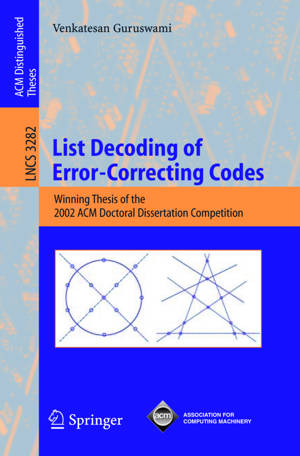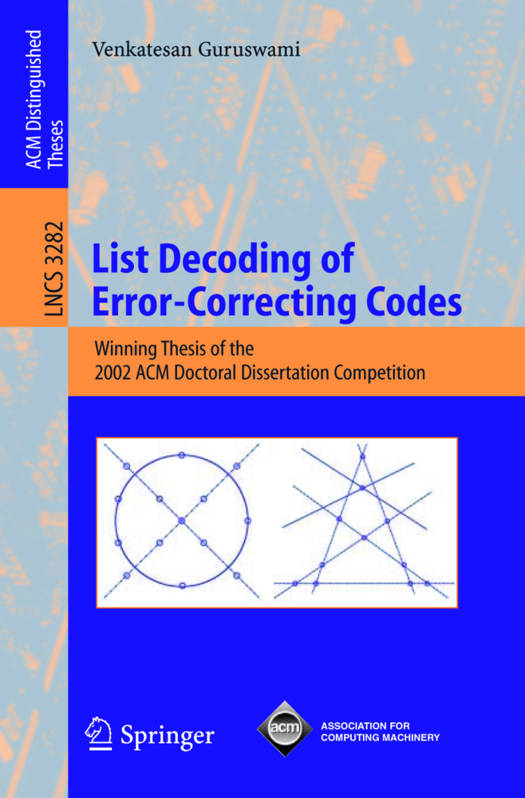
Bedankt voor het vertrouwen het afgelopen jaar! Om jou te bedanken bieden we GRATIS verzending (in België) aan op alles gedurende de hele maand januari.
- Afhalen na 1 uur in een winkel met voorraad
- Gratis thuislevering in België vanaf € 30
- Ruim aanbod met 7 miljoen producten
Bedankt voor het vertrouwen het afgelopen jaar! Om jou te bedanken bieden we GRATIS verzending (in België) aan op alles gedurende de hele maand januari.
- Afhalen na 1 uur in een winkel met voorraad
- Gratis thuislevering in België vanaf € 30
- Ruim aanbod met 7 miljoen producten
Zoeken
List Decoding of Error-Correcting Codes
Winning Thesis of the 2002 ACM Doctoral Dissertation Competition
Venkatesan Guruswami
€ 83,95
+ 167 punten
Omschrijving
How can one exchange information e?ectively when the medium of com- nication introduces errors? This question has been investigated extensively starting with the seminal works of Shannon (1948) and Hamming (1950), and has led to the rich theory of "error-correcting codes". This theory has traditionally gone hand in hand with the algorithmic theory of "decoding" that tackles the problem of recovering from the errors e?ciently. This thesis presents some spectacular new results in the area of decoding algorithms for error-correctingcodes. Speci?cally, itshowshowthenotionof"list-decoding" can be applied to recover from far more errors, for a wide variety of err- correcting codes, than achievable before. A brief bit of background: error-correcting codes are combinatorial str- tures that show how to represent (or "encode") information so that it is - silient to a moderate number of errors. Speci?cally, an error-correcting code takes a short binary string, called the message, and shows how to transform it into a longer binary string, called the codeword, so that if a small number of bits of the codewordare ?ipped, the resulting string does not look like any other codeword. The maximum number of errorsthat the code is guaranteed to detect, denoted d, is a central parameter in its design. A basic property of such a code is that if the number of errors that occur is known to be smaller than d/2, the message is determined uniquely. This poses a computational problem, calledthedecodingproblem: computethemessagefromacorrupted codeword, when the number of errors is less than d/2.
Specificaties
Betrokkenen
- Auteur(s):
- Uitgeverij:
Inhoud
- Aantal bladzijden:
- 352
- Taal:
- Engels
- Reeks:
- Reeksnummer:
- nr. 3282
Eigenschappen
- Productcode (EAN):
- 9783540240518
- Verschijningsdatum:
- 29/11/2004
- Uitvoering:
- Paperback
- Formaat:
- Trade paperback (VS)
- Afmetingen:
- 155 mm x 234 mm
- Gewicht:
- 544 g

Alleen bij Standaard Boekhandel
+ 167 punten op je klantenkaart van Standaard Boekhandel
Beoordelingen
We publiceren alleen reviews die voldoen aan de voorwaarden voor reviews. Bekijk onze voorwaarden voor reviews.









